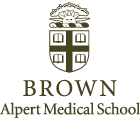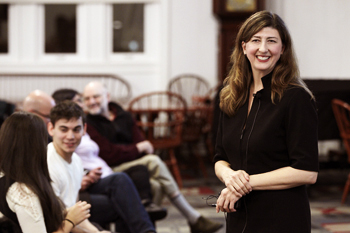Projects
FAHEM projects include the lecture series and seminars outlined below. Please visit the Events page for information on upcoming events.
Creative Medicine Series
Initiated with gracious support from the Creative Arts Council, as well as the generosity of the Department of Emergency Medicine at Alpert Medical School and the Cogut Center for the Humanities at Brown, this series engaged a diverse audience from BioMed, the College, and the surrounding community. Read More
Monthly Humanities Hour
Fourth-year medical students interested in a future in Emergency Medicine or simply honing their emergency medicine skills rotate in the ED monthly. One hour of didactics each month is devoted to a humanities discussion. An article or book selection is given to the students and a discussion ensues based on their reading. We have had a wonderful student response to this session, with this kind of learning being unique to our setting.
Integrated Clinical Arts curricula at Alpert Medical School
We've developed an interactive workshop for medical students called "Description, Deduction, and Speculation." The goal of the workshop is to foster a particular way of thinking that helps students prepare for the complex nature of clinical work. We did not place much emphasis on building visual skills. Instead, our focus was to get students to think about how they think.
In the workshop, students were first instructed to describe the object and create an inventory of what they could see, including the size, colors, materials, shapes and the content. Then, they were instructed to interpret their observations, and draw from their prior knowledge and experiences to make sense of what they were seeing. Finally, they were instructed to use their descriptions and deductions to frame a hypothesis about the work of art. In this final step, students were encouraged to take a leap beyond the object itself and speculate about broader ideas, such as what the object says about its creator, or the values, beliefs, and ideas of its time period.
As students go through each of these steps, they are able to gain unique insight into their own thinking processes. This workshop teaches them how to approach problems with an understanding of their own beliefs, prejudices, and biases, thus avoiding assumptions or cognitive shortcuts that can lead to medical error. Confronted with complex artwork whose meaning is unclear, students learn how to deal with ambiguity and guard against the tendency to form premature conclusions in the face of uncertainty. Much of medical training teaches students how to produce a single correct answer, but not necessarily how to ask the right questions. In the workshop, we instructed students not to ignore messy details for the sake of producing a quick "answer." Instead, students were encouraged to discuss their findings with each other, consider differing viewpoints and work together to formulate questions that could lead to deeper understanding. We believe these types of skills will prove invaluable in the clinical setting.
Related Article
Think Different
by Kris Cambra
Brown Medicine, Winter 2011
An integrated humanities curriculum teaches medical students new ways of seeing.
"I always felt that the most important part of my medical education was the year I took off to write," says Assistant Professor of Emergency Medicine Jay Baruch.
Making model doctors
By Felice J. Freyer Journal Medical Writer
Providence Journal
Brown University medical students get a dose of humanities to help them grasp the ambiguity that real-life care will present


